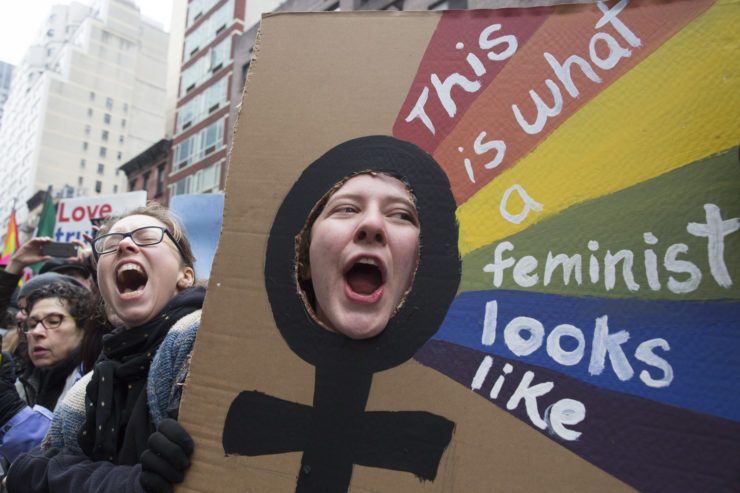If they don't act, white Americans will soon be subsidizing their own destruction.
The Political Character of Marriage and Family Life

Conservatives have to get smarter about sexual politics.
As coronavirus tears through our public and private institutions, the Atlantic’s Helen Lewis has argued it’s a disaster for feminism. Perhaps every cloud has a sliver lining. It’s high time we reversed the advance of this deceptively simple ideology in our society.
For decades, feminists have achieved remarkable political success by arguing that forces of male power (and biology) have made women into the subordinate sex; if male power can be torn down and the effects of biology minimized, a new order congenial to women would be built in its place. In this new order, women would be no different from men—and therefore they would finally be truly independent.
Feminist mantras like “the personal is political” shape this political project. Before feminism, many liberally-minded conservatives were keen to argue that the personal was beyond the scope of public concern. What a man and a woman did in their own bedrooms or kitchens was, the argument went, neither the government’s business nor, broadly speaking, the public’s business. Sex connected love and marriage, among other things—and love was far away from the realm of politics. How a husband and wife divvied up household chores or whether a man made more than his wife were simply facts that politics took as givens rather than political issues in need of constant adjustment.
Feminists insisted upon making all of these “personal” matters “political.” Men, feminists claimed, exerted power over women in their personal relations. This wielding of power made women “the second sex,” as Simone de Beauvoir famously wrote. Women had sex on their backs, in “the posture of defeat,” as an emblem for passivity and obedience for their whole lives. Love was a tool of oppression, invented to get women to love their oppressor men.
The Biological Argument is Not Enough
This “sexual division of labor,” say the feminists, kept women doing “sh**twork” around the house while men soared toward fulfillment in the “workplace.” Motherhood became the centerpiece of women’s oppression. The biological became political. Thousands of academic careers have been made giving these ideas different names, applying them to ever-new situations, and—most crucially—inventing ways around them.
In response, some intellectuals and scholars have tried to reclaim biology from politics. Biological teachings alone, however, encourage a political quiescence: a belief that men will be men, women will be women, and there is only so much feminist ideologues can do until they run up against the limits of nature. This return to biology, while fundamental and crucial, is not enough to meet the feminist challenge.
Critics of feminism have long defended the “personal” from the political understood as an expression of power. The idea that relations between the sexes are primarily about power, as opposed to an expression of love, is (among other things) ridiculous. So is the idea that love itself is a tool to keep women down. Power is implicated in each, no doubt, but power hardly explains sex.
As feminists marched through our institutions, hundreds of evolutionary scientists in academia and elsewhere courageously showed that the differences between men and women are not traceable to power dynamics. Biology, genetics and neurobiology demonstrate that a human being is not just meaningless matter that can be arranged politically, however men or feminists will it. There are limits to human creativity and hence to feminism.
But what we must rediscover is that the personal is political—just not in the way feminists think. Politics is not only about power, but about securing justice and pursuing the good. Reigning public ideas about man, woman, sex, marriage, and family life inform how people think about these things. Prevailing notions of what is honorable and shameful or advantageous and just help citizens to translate maleness and femaleness into ways of life.
The Politics of Feminism
Feminism’s profoundly political triumph lies in initiating a revolution in our ideas of womanly honor, beauty, and goodness. Feminists gave birth to the Independent Woman and today’s celebrated New Girl Order (in Hannah Rosin’s phrase). This new woman above all honors the independence gained from placing career above domestic life and marriage. This new notion of honorable womanhood transforms her entire life course.
Under the old order, as Barbara Whitehead writes, girls were educated to “helpfulness, charm, niceness, thrift, patience, personal sacrifice, and forbearance,” while New Girls are taught to “speak up for themselves, to compete and strive for individual excellence, and to take initiative and responsibility for their economic lives.” The New Girl doesn’t want a man to think of himself as a provider. Resumé building, not home economics. Pictures of graduation on the wall, not wedding pictures.
This way of translating female concerns into a political or gendered idea produces young women ready to work for government, non-profits, universities, and human resource divisions. Slews of laws are designed to make her comfortable at work (e.g., sexual harassment laws, subsidized day care), technologies such as oral contraception abet her hookups, while no-fault divorce and custody laws enable her to shed marital ties. She sleeps around some. As Rosin proclaims approvingly, “feminist progress is largely dependent on the hook-up culture.”
The feminist political ideal, then, does seem to do justice to women, at least in terms of equality. Should not women have the same opportunities as men? In this understanding of justice, we know we have achieved equal opportunity only when we have equal results in all facets of life.
But appeals to equal opportunity, however ubiquitous, are insincere. If they were sincere, feminists would complain about disparities in mechanical professions like plumbing or truck driving, or in accident rates at work, where men make up over 90% of workplace deaths. Equal opportunity is a tool, selectively applied, to get the Independent Woman in the right kind of job: safe, contained, people-centered, demanding attention to details, mentor-led, and personally fulfilling.
The True Politics of Sex
Feminists rightly see that how a people translate maleness and femaleness into daily life is a political question. Feminism’s political vision of the Independent Woman must be met on the level of politics with an alternative vision that takes sex differences into account but does not depend on those differences naturally emerging as gender. Human beings are naturally political, and as our history since the 1950s demonstrates, politics shapes the family.
Ultimately, the greatest political concern is not justice, but human happiness and its pursuit. Feminism asks the wrong political questions and dismisses the challenges to happiness posed by sexual difference.
The political question we need to ask ourselves is this: Given the differences between men and women, what mores, institutions, and laws will best help them lead happy and rewarding lives?
Nature does not point unambiguously to marriage and family life. Men possess greater sexual desire and a greater desire for sexual variety, but also a greater restlessness because their link to community and the generations is insecure. Physically, women have the awesome ability to renew the species, especially at a younger age, but our control of birth means that this is more a choice than an accident. Psychologically, women are hubs of social life, just as children are hubs of community, but ultimately when having children they are dependent upon married men willing to help raise them.
Marriage was the centerpiece of our old sexual regime. As the founders of our civilization knew, it was a key political institution that translated nature and sex into gendered expectations for each. Monogamous, enduring marriage taught each sex what it had to do to achieve happiness and fulfillment in a way consistent with their natures and capacities.
Men’s sexual passions were connected to serving and providing for a wife and family. Men’s work was meaningful in large part for what it provided their families. Men were connected to children and community through their wives. Women’s sexual and social desires were connected to a particular man, whom she expected to provide for her, and having and raising children. She gained honor and found meaning through her connection to her husband.
Feminists, among others, successfully stripped the public honor from the old marital form. As a result, there is a new way of translating nature and sex into gender. The Independent Woman is the centerpiece of our new sexual regime. No man will be taught that it is honorable to provide, while no woman will be taught domestic virtues or to expect someone to provide for her. The new marriage, even at its best, is less fecund, calls forth less devotion, and becomes more a society for pleasurable companionship with benefits than a community.
The vision of the Independent Woman provides guidance to girls and young women on how to plan their lives. The grip of ideology is so tight that it is difficult for the soft whisper of nature or love to be heard. Yet there are signs that it is dissatisfying in the long run. Anxiety and depression are increasingly pervasive among girls and young women. But the career mystique makes promises of fulfillment that few jobs can satisfy: many older women, childless or with a small brood, end up asking, “is this all there is?”
Feminism is favored especially by corporate interests. Corporations love having a slew of conscientious, risk-averse employees to keep the wheels turning, especially if they are satisfied in middle management. The fewer children these women have, the more conscientious the employee.
As the vision of the Independent Woman becomes more and more entrenched, relations between the sexes are more complicated and less satisfying. In certain parts of the world like East Asia, where the vision has been more monolithically entrenched for longer, mass sexual indifference and all its accompanying pathologies—things rarely seen in human history and never seen without persistent indoctrination—make us wonder: could this happen here?
Honor and Public Life
The only way to combat the political vision of feminism is to focus the argument on the unhappiness of women (and men) today and accordingly propose a new political vision of the old sexual regime duly changed for our circumstances.
First, this new vision must boldly address what many men and women still say they want, and yet are prevented from having in today’s society: a family in which one parent (usually a man) in the workplace can support the other parent (usually a wife) and children at home. A new political platform must explicitly support this still-widespread desire, and encourage and protect its expression against those who deride it.
Second, we must not shy away from the fact that promoting happiness is political, and this means politically promoting the choice for life—both having and raising children and the life of the family—from the totalizing feminist understanding of justice.
Third, we can politically promote a deeper understanding of justice that recognizes our sexual differences. I suggest we promote a vision of womanhood that honors part-time work instead of careerism.
No one doubts that women can succeed in almost any career. Women will be more than mothers and nuns in our political order: they will live long lives which extend well after their children are no longer around to raise. Household tasks take less time than they did before cheap textiles, refrigerators and washing machines. Honoring part-time work allows women time to make a home and build relations, while also exercising other faculties. It would also call forth more responsibility and duty from men.
As feminists have long known, the personal is political. The political project of reconstructing this old sexual regime—with modifications, no doubt—depends first on forthrightly identifying the challenges nature poses for each sex, criticizing the new sexual regime as immiserating and inadequate to those challenges, equipping those who would live according to the old way, and affording them public honor.
Conservatives have long hoped that “nature” would provide a correction to feminism. That corrective can only come from a politics, in the most comprehensive sense, that restores honor to family life.
The American Mind presents a range of perspectives. Views are writers’ own and do not necessarily represent those of The Claremont Institute.
The American Mind is a publication of the Claremont Institute, a non-profit 501(c)(3) organization, dedicated to restoring the principles of the American Founding to their rightful, preeminent authority in our national life. Interested in supporting our work? Gifts to the Claremont Institute are tax-deductible.
Real equality means recognizing that men and women often have different priorities.
Connecting the dots the experts won’t
An English literature professor describes how he came to love teaching Freshman Comp.
OnlyFans and the Sordid Underbelly of our Ruling Class
Media culture sells girls’ bodies—and souls—for parts.






